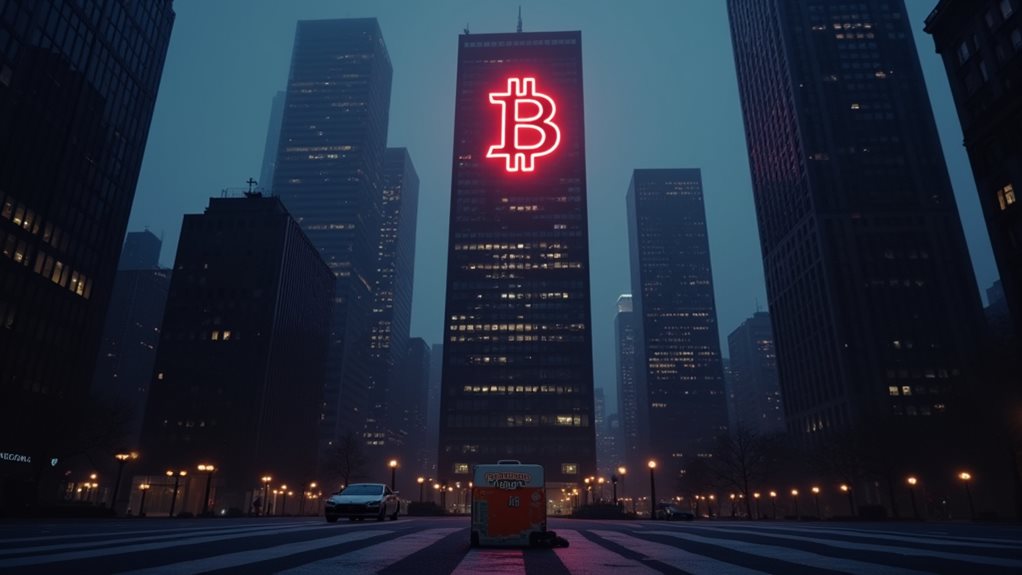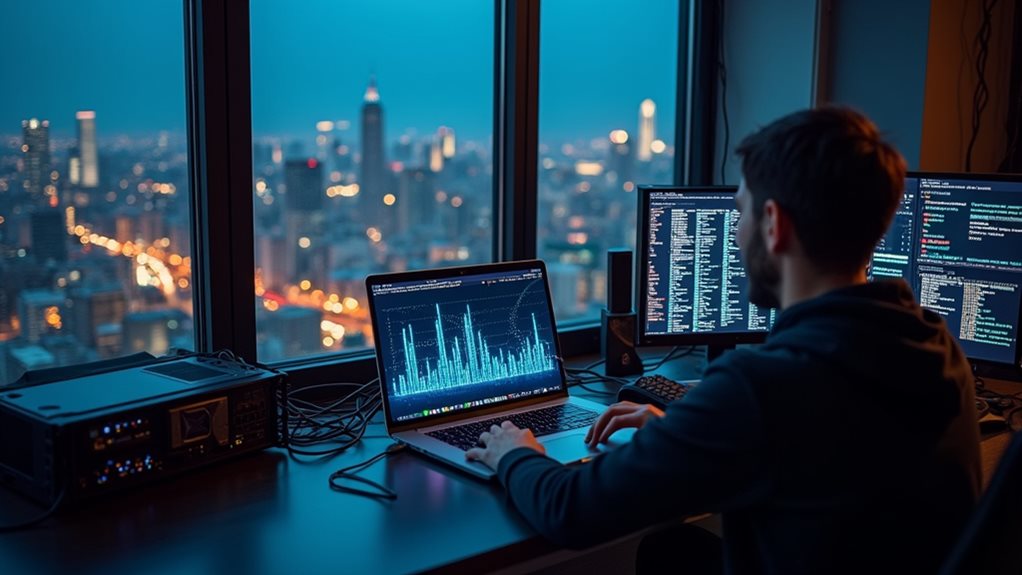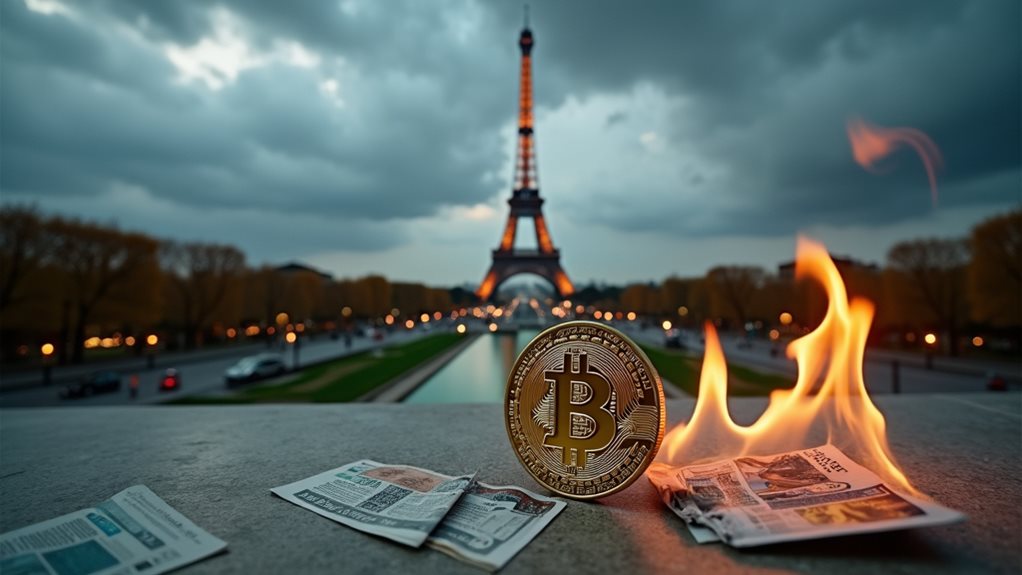Bitcoin's hidden gems go beyond its mysterious creator. The genesis block contains a rebellious message from The Times newspaper, taking a jab at traditional banking. A bronze statue in Budapest uses reflective surfaces to symbolize Bitcoin's universal nature – pretty meta. Mining all Bitcoin will take until 2140, and someone once casually moved 500,000 BTC while paying pocket change in fees. Just the tip of the cryptocurrency iceberg.

While most people know Bitcoin as the cryptocurrency that made some folks filthy rich and others tearfully regretful, its history contains fascinating details that rarely make headlines. Few people realize that Bitcoin's mysterious creator, Satoshi Nakamoto, launched the network with a pointed political message. The genesis block contained a Times newspaper headline, basically giving the middle finger to traditional banking. Talk about making an entrance.
Bitcoin's creator didn't just launch a cryptocurrency – they embedded a rebellious message against traditional banking right into its DNA.
The pizza story gets tossed around a lot, but here's the kicker: those two Papa John's pizzas, bought for 10,000 Bitcoin, weren't even particularly good pizzas. Just regular old delivery pies that would now be worth enough to buy multiple Papa John's franchises.
And speaking of ridiculous numbers, someone once transferred 500,000 Bitcoin in a single transaction – with a fee so low it would make Western Union executives weep. Before Bitcoin, digital currencies like ecash by David Chaum attempted but failed to solve the double-spending problem. A bronze statue in Budapest shows Satoshi Nakamoto with a reflective face surface that mirrors viewers, representing Bitcoin's universal appeal.
The Internal Revenue Service classified Bitcoin as property back in 2014, creating major tax implications for traders and miners alike.
Bitcoin's security is no joke, though. There's no "forgot password" button in crypto-land. Zero. Zilch. Nada. Some poor souls have literally thrown away hard drives containing fortunes in Bitcoin. One guy's been begging his local government to let him dig through a landfill for years. Modern innovations like Wrapped Bitcoin now allow Bitcoin holders to participate in decentralized finance platforms while maintaining their core investment.
Meanwhile, there are roughly 100,000 Bitcoin millionaires out there, probably sleeping with their hardware wallets under their pillows.
Here's something wild: about 90% of all Bitcoin has already been mined, but the last coin won't be mined until 2140. Why? Because the mining reward keeps getting cut in half every four years. It's like a digital game of hot potato that lasts over a century. Currently, miners get 6.25 Bitcoin per block, but they need enough electricity to power a small country to get it.
El Salvador made history by making Bitcoin legal tender, while other countries are still treating it like a suspicious package at the airport. The whole system has moved nearly $10 trillion since it started, yet some folks still think it's just internet funny money. The irony is thick enough to spread on toast.
The cryptocurrency's impact goes beyond finance. There's literally a holiday called "Bitcoin Pizza Day." Imagine having a holiday named after your expensive food delivery mistake.
Bitcoin's also spawned an entire culture of crypto enthusiasts who speak their own language of "hodl" and "to the moon." Not bad for something that started with an anonymous white paper and a dream of giving traditional banking a run for its money.
Frequently Asked Questions
What Security Measures Protect Bitcoin From Quantum Computing Attacks?
Bitcoin's main defense against quantum attacks lies in its p2pkh addresses – as long as public keys stay hidden, quantum computers can't crack them. Smart move.
Other protections include ongoing work on quantum-resistant algorithms and the ability to upgrade Bitcoin's cryptography through soft forks.
There's also the time factor – quantum computers aren't advanced enough yet to break Bitcoin's encryption.
Still, developers aren't taking chances.
How Does Bitcoin's Mining Difficulty Adjustment Algorithm Prevent Network Manipulation?
Bitcoin's difficulty adjustment algorithm acts like an automated bouncer, keeping the network in check every 2,016 blocks.
It's pretty clever – if miners try to speed up block creation, the difficulty shoots up. Try to slow things down? It drops.
The system demands more computational power when hash rates increase, making manipulation extremely expensive.
Want to mess with the network? Good luck. You'll need massive resources and deep pockets.
Can Bitcoin Transactions Be Reversed if Sent to Wrong Addresses?
No, Bitcoin transactions cannot be reversed once confirmed – period.
That's just how blockchain works. Once those miners validate a transaction, it's permanently etched into the blockchain's history.
Wrong address? Tough luck. The funds are either lost forever or sitting in someone else's wallet.
Unless the recipient voluntarily sends them back (good luck with that), those coins are gone.
It's a harsh reality of decentralized finance.
Why Do Some Bitcoin Addresses Begin With Different Numbers or Letters?
Bitcoin addresses start with different characters to indicate their type and functionality.
Legacy addresses begin with "1," Script addresses with "3," SegWit with "bc1q," and Taproot with "bc1p." Each prefix represents different technological upgrades and features.
Think of them like zip codes – they tell you where you're going. SegWit addresses are cheaper to use, while Taproot offers better privacy.
It's Bitcoin's way of evolving while staying backward compatible.
What Happens to Lost Bitcoins When Wallets Become Permanently Inaccessible?
Lost bitcoins stay frozen on the blockchain forever – just sitting there, taunting their former owners.
When private keys vanish, those coins become permanent digital paperweights. They're still visible, still counted in Bitcoin's total supply, but completely untouchable.
Like digital zombies, these coins are technically "alive" on the ledger but dead to the world. Current estimates suggest up to 25% of all Bitcoin is lost this way.
Pretty brutal.









